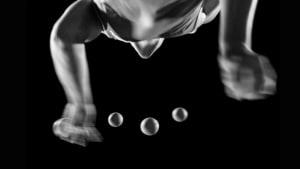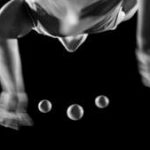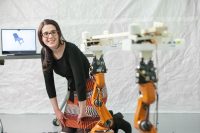You Don’t Really Know How (Un-)Talented You Are, According To Science
First, the good news: There’s a spate of new technologies to help companies measure and predict their employees’ talents, and it’s only a matter of time before artificial intelligence becomes a normal part of the hiring process. But now for the bad news: Those innovations have to surmount one pretty big obstacle first—human intuition.
The fact is that people just aren’t very good at knowing how talented they are at one thing relative to another, let alone at making objective (or even objective-ish) assessments about the strengths and weaknesses of others. Don’t despair, though. There are a few low-tech ways to size up your skill-set more accurately long before the robots roll in and do it for you.
1. Stop Looking For “Talent” In The First Place
One of the reasons talent is hard to observe is that it’s just an abstract concept, a story we invent to make sense of people’s accomplishments. When you know somebody, you might infer how talented they are based on their achievement and how well they’ve performed in school or at work, for instance, but even that is just an intuitive guess. Since all you have to base your judgment on are outcomes, it’s impossible to know which ones were caused by luck, hard work, or even just an ability to deceive people into getting what they want. You can’t possibly estimate how much any of these factors might have contributed to their success.
But it doesn’t stop there. Our own biases distort the objectivity of our judgments–on top of the shaky measures we rely on in order to make them. For instance, when we compete with a colleague for a promotion, we’ll naturally underestimate their abilities and overestimate the likely role of luck or nepotism in the contest, just so we can feel better about our own chances (or egos, if we lose out). This tendency, which psychologists term “motivated reasoning,” distorts our view of reality to such a degree that we unconsciously sacrifice a truth that makes us look bad in order to embrace a lie that makes us look good.
So whether you’re applying to a job or sitting on the other side of the table as a hiring manager poring over resumes, things may feel pretty hopeless. Even professional talent spotters rely too much on their intuition, causing organizations to be pretty clueless about their employees’ talents and potential. That’s one major reason why what 20-odd years ago was heralded as a “war for talent” has devolved into a war on talent; instead of attracting, harnessing, and unlocking human potential, organizations are alienating the majority of their employees, including their top performers.
One of the simplest ways out of this rut is a shift in mind-set: Just stop actively looking for “talent”–you’ll always be led astray–and seek out some other types of information instead, like these . .
2. Get Negative Feedback
Constructive criticism could probably do a lot more good inside organizations if only more people were comfortable taking it. Simple as it sounds, you can actually get a better handle on your comparative strengths and weaknesses by asking others to tell you what they think you’re doing wrong (or not just very well).
Make no mistake: Their feedback will be imperfect, too, for the same reasons your own self-assessments are, but that’s why it’s important not to ask just anybody. Seek out people with expertise, experience, and authority in the specific area where you’re looking for feedback. (You wouldn’t ask a high school music teacher to give you tips on your jump-shot, would you?) And make sure the people you’re asking aren’t your best friends in the office. The people closest to you are bad sources of feedback because they like you; even if they think they’re being fair, they’ll subconsciously skew their criticism to avoid upsetting you.
By the same token, you can crowdsource information about other people’s abilities, creating an informal version of a 360-degree feedback that’s actually pretty reliable. Our evolutionary ancestors lived in small groups where everybody had a reputation. Even in an age of virtual work and remote teams, you can still get a fairly accurate read on someone’s reputation for strengths in one area and weaknesses in another just by asking multiple sources to report on them–in other words, by tapping the power of collective intelligence.
3. Look For Four Key Traits
Talent is obviously context-dependent. Serena Williams can crush Warren Buffett at tennis, while he’d probably be better than her at managing your money. But leaving aside technical expertise and skills like these, there are some fairly universal qualities that determine systematic individual differences in career-related talent.
Here’s a little thought experiment to work backward from. The perfect human would likely include the following psychological traits:
- High general intelligence, which translates into the ability to learn complex things rather quickly
- High curiosity, which would fuel her appetite for ongoing, deep learning
- High emotional intelligence, which would make her more likable and rewarding to deal with
- High ambition, which would allow her to remain dissatisfied with her achievements, constantly striving to improve
Research shows that, with the right instructions and a little practice, most people are generally quite good at assessing these traits in others, even after relatively short interactions with them. This means you can also ask others to assess them in you (which goes back to point #2, on gathering negative feedback).
4. Distrust Self-Claims
One of the easiest ways to misjudge others’ talents is to take them at their own word. From an evolutionary perspective, self-deception is actually adaptive because being unaware of your limitations can help you fool others into thinking that you’re better than you actually are.
Unfortunately, this is how so many incompetent people succeed through sheer overconfidence, and it’s why competent people who aren’t totally full of themselves end up flying under the radar. So as a general rule, simply ignoring what people say about their own strengths and weaknesses can make you a better judge of them. Most people who say they’re great at something are unlikely to be better at it than those who “confess” to being bad at it. As the famous Dunning-Kruger effect shows, experts and fools don’t differ much in their self-estimated competence–it’s just that narcissists have proved extraordinarily good at marketing talents they don’t actually possess.
Like in any domain of competence, your talent-judging ability will only improve if you acknowledge your limitations, are passionately curious, and willing to put your models and theories to the test–even at the risk of harsh criticism. Only by trying to disprove your preconceptions can you know whether those beliefs are right. But do that, and judging strengths and weaknesses might even become a bonafide strength of yours.
But don’t freak out–neither does anybody else.
First, the good news: There’s a spate of new technologies to help companies measure and predict their employees’ talents, and it’s only a matter of time before artificial intelligence becomes a normal part of the hiring process. But now for the bad news: Those innovations have to surmount one pretty big obstacle first—human intuition.
Fast Company , Read Full Story
(30)













